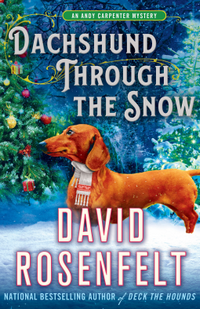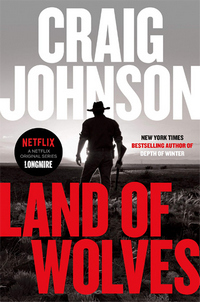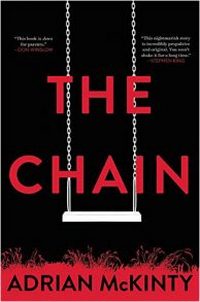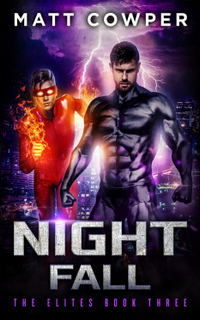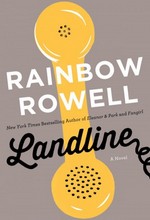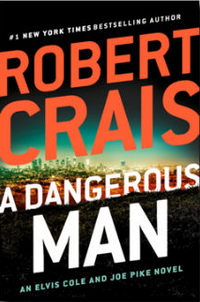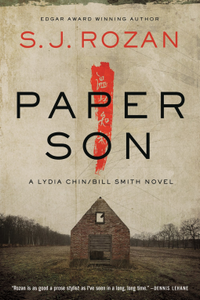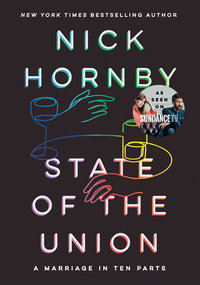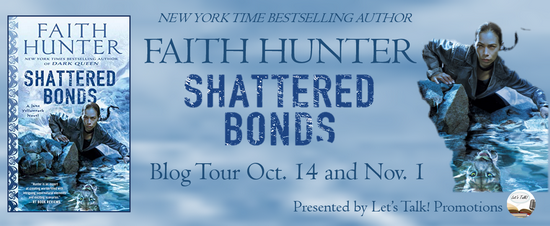
I’m going to have to spoil a little about Dark Queen, and a little bit of earlier books, too. Read at your own risk.
—
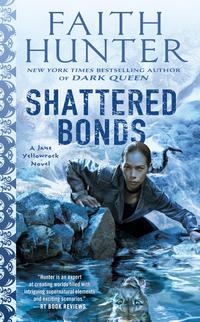 |
Shattered Bondsby Faith Hunter eARC, 400 pg. Read: October 24-28, 2019 |

It didn’t take me too long after starting to read this thirteenth installment in the Jane Yellowrock series to start asking myself: How am I going to possibly write anything about this? I kept asking myself that right up until I finished it this afternoon. Now, an hour past my self-imposed deadline for finishing this post, I’m still no closer to coming up with an answer.
There is simply no substitute for reading Shattered Bonds—no summary, no recap, no review can adequately hint at what the reader will experience. That’s almost always true of any book, but it’s sometimes more true than usual.
Remember Joseph Santana—also known as Joses Bar-Judas, or Yosace Bar-Ioudas. One of Judas Iscariot’s two sons, one of the original vampires? We never saw him at his full-strength, just weak, hungry, and chained up—that is, until he became Brute-chow. He was dangerous and frightening then. It turns out that Sabina was right when she said that Joses was the least-dangerous member of this family. What his brother, Shimon Bar-Judas, does to Jane’s allies and friends before she’s aware that he’s a factor in her life is devastating. What he does once he’s on her radar? Well, it’d take a novel to describe—and hey, that’s what we have here.
Last we saw Jane, she’d basically given up between the grief after the Sangre Duello and cancer caused by using her timeshifting magic and headed off to die. Intervention by Eli, Alex, and Bruiser have brought her back from the edge, but they’re only helping her manage the symptoms (and arguably not doing that much for them). But seeing what Shimon has done, is doing, and what it looks like he will do to her people galvanizes her into action. Sure, she might be dying, but she’s not going to stop fighting—especially if it comes down to protecting those that are near and dear to her, or those that she owes something to.
It occurs to me as I wrote that last sentence—this might be the most I’ve ever admired Jane.
Not only is Jane newly-inspired to keep on living after dealing with Shimon, some of the things she does so she can be/appear strong enough to challenge him gets her thinking of new (and hopefully more effective) ways to fight her cancer. Jane learns new and more ways to use her magic all the time, which has put her in this situation. Now it’s time to see if she can do something to get her out of it.
An unhinged, power-mad, brilliant and cruel predator on the one hand, and seemingly incurable cancer on the other. Yeah, Jane’s got her work cut out for her.
I was musing on things somewhere around the 60% mark, and I started wondering about the title—yeah, sure there were a couple of things early on that you could apply the title to. But I didn’t think Hunter was going to let us get away with anything so simple. So what could she be referring to? And then when I thought about who and what could get shattered? What ties, bonds, or connections could be irreparably damaged in the last 35-40% of the book?
Suddenly, I strongly considered following Joey Tribbiani’s lead and storing this in my freezer. Unlike Joey’s paperback, that would’ve ruined my Kindle, so I really had no choice but to keep reading. I started to compose a list of characters who I’d worried about surviving this novel (up to and including Jane)—and then I abandoned that. Instead, I composed a list of characters in this book (including some who don’t see, just get a second-hand report about), and I came up with one name. Just one. That’s a lot to worry about. I worried less about people making it through Dark Queen—which featured a series of literal duels with some of the most dangerous characters Hunter has created.
Spoiler: Rest easy, Alex Younger fans, nothing to worry about. If your favorite is anyone else? Sorry.
This is actually one of Hunter’s richer titles—you can mine a lot from this one. I don’t want to spend too much time on this point, because Eli does a more effective job than I will (so does Alex, come to think of it), but there’s something striking about the idea that Jane has bonds to shatter. Back in Skinwalker when we met her, she was a lone wolf (sorry, Brute) type of figure—yeah, she liked/loved others (see: Molly) and enjoyed the company of people. But she didn’t need anyone but our favorite witch. She only sought allies when the numbers against her were overwhelming, and even then, she didn’t rely on them much for the important matters. She’s still learning how to. Slowly but surely, Jane has been expanding her social, professional and familial circles—she cares for people, feels responsible for them, and is aided by them.
Ten books ago, there weren’t bonds to be shattered. But now, there’s a wide net of connections branching out from Jane. This makes her more vulnerable, but—when she remembers this—it’s also a source of strength and security. This character development/growth is one of my favorites in ongoing series. Not just because I like seeing Jane grow, but primarily because Hunter’s doing such a good job in depicting it.
I could do a few paragraphs on other bonds, too—think of imprisonment, slavery, history (cultural or personal). But you get the idea.
On a lighter note—only in the Carolinas do you get vamps talking this much about barbecue. It made me smile. Still does.
Last thought—Nell Ingram’s dealing with a lot of changes already, but some of Shattered Bonds is going to spill over into her world and I’m eager to see how that works itself out.
I’ve apparently found some things to talk about—hopefully this whets your appetite enough to grab this (although, I can’t imagine anyone reading this series who needs convincing). A fantastic entry in this fantastic series—action, danger, love, loss, highs, lows, barbecue, and the best hunter—Shattered Bonds has it all.

My thanks to Let’s Talk! Promotions for the invitation to participate in this tour and the materials (including the book via NetGalley) they provided.
![]()


